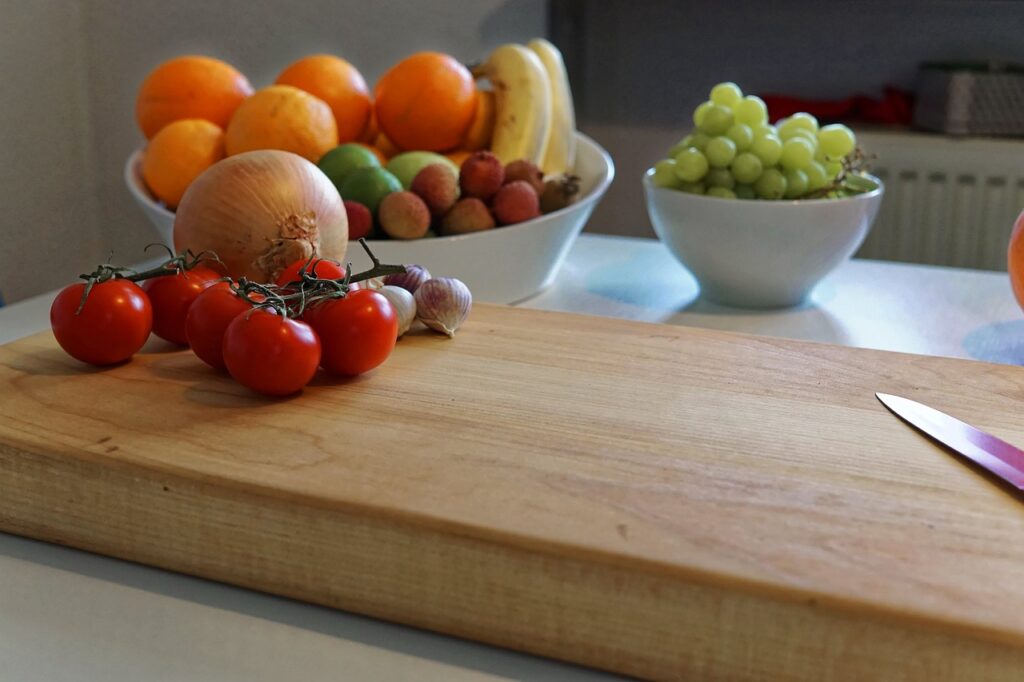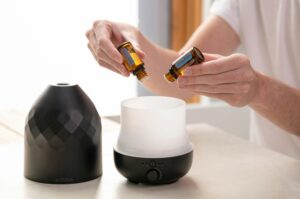The toxic load refers to the accumulation of chemicals and toxins in the body over time. The body can start to experience various health issues when the body’s toxic load reaches a certain point. Living a non-toxic lifestyle can help reduce this toxic load. We are experiencing more toxins than ever from food & drinks (especially in the U.S.), the environment, self-care products, cleaning products, and more. Humans, animals, and the environment benefit from using non-toxic products. Learn more about how you can make switches in your personal life to try and reduce your exposure to toxins on a day-to-day basis.
#1 Stainless Steel and Cast Iron Pots and Pans
Nonstick pans can release harmful toxins that can transfer to your food when you cook with them. The chemicals used to create the nonstick coating use per and polyfluoroalkyl substances, also known as PFAS or forever chemicals. Common health issues like cancer, reproductive issues, liver damage, and preeclampsia are linked to PFAS. Nonstick pans are not intended to be used on high heat or with metal utensils that can scratch the coating causing the toxins to be cooked into your food.
Benefits of Stainless Steel and Cast Iron Cookware
Stainless steel pans are long lasting, reliable, and also oven-safe. They’re free of toxins and don’t release any chemicals into your food. Additionally, it heats up quickly and allows for an even heat distribution. Cast iron cookware is also chemical free, very durable, oven-safe, and naturally nonstick. Cast iron cookware also adds iron to your food when cooking, so this is a great option if you are iron-deficient.

#2 Glass Tupperware Instead of Plastic
Many brands have noticed the public concern of BPA and have decided to go “BPA Free” – replacing Bisphenol A with other Bisphenols. Instead of BPA, you might see BPS, BPF, BPB, and BPZ. These replacements are not always entirely safer to use than BPA, some have shown through scientific studies to have similar risks. Tupperware that is “BPA Free” will have a number 1-6 on the bottom of the container. Tupperware that contains BPA will likely have the number 7 on it often inside of a triangle
Plastic food storage is usually made of Bisphenol A also known as BPA. This is a chemical that has a known association with infertility, attention deficit hyperactivity disorder and aggression among children. This chemical is estrogenic and it is best to reduce exposure to it when trying to conceive, during pregnancy, and while breastfeeding. BPAs are currently banned from baby bottles and sippy cups… but still allowed in all of your plastic food storage. BPA also shows a positive correlation to risk of cardiovascular disease.
Risky Ways To Use Plastic
Putting your plastic food storage in the dishwasher or just reheating it in the microwave can increase the likelihood that these harmful chemicals are entering your food. Even putting highly acidic foods like citrus fruits can have a negative effect on plastic food storage. Be aware of any color changes in your plastic as this can be a sign of chemical change. According to the US Institute of Environmental Health Sciences daily BPA exposure mainly happens from your diet.
The Better Alternative
Overall, it is better to store your food in glass food storage. Glass is nonporous, ensuring toxins will not be absorbed or released into your food when using glass. This makes it safer to reheat and dishwash glass food storage. Glass is also safe for high temperatures so it is oven-safe. Additionally, it is environmentally friendly and stain-resistant. Other safer options include: stainless steel, ceramic, and porcelain.
#3 Replace Air Fresheners & Candles With Essential Oil Diffuser
Many air fresheners and candles often contain synthetic chemicals that may release toxins and allergens. The synthetic chemicals often mask odor instead of eliminating it. Common ingredients include phthalates, formaldehyde, benzene, and volatile organic compounds (VOCs). These can pose health risks when released into the air and are linked to respiratory issues, headaches, and even hormone disruption.
Candles can also be toxic due to ingredients like paraffin wax, synthetic fragrances, and metal-based wicks. Paraffin wax comes from petroleum and can release harmful byproducts like toluene and benzene when burned. Toluene and benzene are both known carcinogens. Wicks with metal cores can pose a risk of heavy metal poisoning over time as some may contain lead. Pollutants from candles accumulate in enclosed spaces. This can potentially cause headaches, dizziness, and long-term respiratory problems, especially with frequent use in poorly ventilated areas.

On the other hand, essential oils derive from plants and contain no artificial fragrances. A diffuser provides the benefits of pure plant-based scents without exposing you to harmful substances. This makes it a healthier choice especially for those with asthma, allergies, or chemical sensitivities. While candles burn up quickly and need constant replacing, a small amount of essential oil can last through multiple uses. Certain essential oils like lavender, even have natural calming properties that can enhance relaxation. Overall, diffusers offer a cleaner, more efficient way to enjoy aromatherapy benefits without the waste and risks associated with candles and air fresheners.
If you still prefer to use candles, a good alternative is Fate Naturals. They have candles that are certified non-toxic and infused with essential oils.
#4 Non-Toxic Household Cleaning Products
Many household cleaning products contain toxic chemicals that can negatively affect health and the environment. Common ingredients like ammonia, bleach, and hydrochloric acid are highly effective at disinfecting and breaking down grime but can also irritate the skin, eyes, and respiratory system. When mixed, certain products can release toxic gas. For example, bleach and ammonia produce chloramine gas, which can cause coughing, chest pain, and even lung damage if inhaled.
Additionally, many cleaning products contain synthetic fragrances, dyes, and preservatives that release volatile organic compounds (VOCs) into the air, potentially triggering allergies, asthma, and headaches. Beyond personal health, these chemicals can also have lasting environmental impacts when washed down drains, polluting waterways and harming aquatic ecosystems. Opting for natural or non-toxic cleaners can reduce these risks and create a healthier home environment.
A good product for toxin-free household cleaner is anything from the Branch Basics brand.
#5 Non-Toxic Dish Soap
Dish soap can be toxic because it again, often contains chemicals that harm both health and the environment. Many brands use synthetic surfactants to create lather, but these can cause skin irritation and are slow to break down in nature. They also contain things like sulfates, phosphates, and artificial fragrances. These also cause skin irritation and can be harmful to aquatic life.
Using non-toxic dish soap is the best choice for protecting both your health and the environment. With non-toxic options, you avoid exposure to these harmful ingredients, reducing the risk of skin irritation and chemical residue on your dishes. Many non-toxic dish soaps use biodegradable, plant-based ingredients that are gentle on skin and safer for household use. This makes it a more sustainable and family-friendly choice. By switching to non-toxic dish soap, you ensure that your dishes are clean without introducing unnecessary chemicals into your home and the ecosystem.
#6 Wooden Cutting Boards
Using wooden cutting boards is often the best choice for food preparation because of their durability, natural antibacterial properties, and gentleness on knives. Wooden cutting has natural antimicrobial qualities that make it harder for bacteria to survive. Studies have shown that bacteria trapped in wood’s pores often die off more quickly than they would on plastic or other materials. Additionally, wooden cutting boards are easier on knives, helping blades stay sharper for longer. With proper care, wooden boards can last for years. By choosing wood, you get a long-lasting, hygienic, and eco-friendly option for your kitchen.

Unlike plastic, which can develop deep grooves that harbor bacteria over time. Many plastic cutting boards are made from materials like polyethylene and polypropylene. These can degrade over time and release harmful chemicals when heated or scratched. Also, plastic cutting boards contribute to plastic waste as they are not biodegradable and often end up in landfills.
#7 Invest In An Air Purifier
An air purifier offers numerous benefits that significantly improve indoor air quality and promote better health. By filtering out pollutants such as dust, pollen, pet dander, and smoke, an air purifier helps reduce allergens that can trigger asthma and allergy symptoms. This helps to create a more comfortable and non-toxic living environment.
Many air purifiers also utilize advanced technologies, such as HEPA filters and activated carbon, to capture harmful chemicals and odors, providing cleaner and fresher air. HEPA filters can remove over 99.9% of allergens. Additionally, using an air purifier can minimize the impact of indoor air pollution caused by household products and cooking fumes, promoting overall respiratory health. By investing in an air purifier, you can create a healthier home environment and enjoy cleaner air for you and your family.
#8 Non-Toxic Laundry Detergent
Laundry detergent can be toxic because of the chemicals used to enhance cleaning power, fragrances, and appearance. Many detergents contain surfactants which help lift dirt but can irritate the skin, eyes, and respiratory system. They also contain phthalates that may cause allergic reactions and disrupt hormones. As well as, optical brighteners—chemicals added to make clothes appear whiter—which are not biodegradable and may persist in the environment, potentially harming aquatic life when washed down the drain.
In 2023, New York state banned any laundry detergent with more than 2 PPM of 1,4-dioxane, a probable human carcinogen. The following laundry detergents were banned in NY due to containing over the allowed amount of this forever chemical:
- Arm & Hammer Clean Burst
- Tide Original
- Arm & Hammer Sensitive Skin Free & Clear
- Gain Original + Aroma Boost.
NY State is also considering banning tide pods as they contain polyvinyl alcohol (PVA) in efforts to help reduce microplastic pollution.
#9 Using 100% Cotton Bedding/Sheets
Using 100% cotton bedding brings comfort, breathability, and a range of health benefits to your sleep environment. Cotton naturally wicks away moisture, helping you stay cool and dry throughout the night. Cotton is gentle on the skin, making it ideal for people with sensitive skin or allergies. It is also eco-friendly and biodegradable, and offers a sustainable choice that reduces environmental impact.
Bedding containing polyester has several downsides, especially concerning comfort, health, and environmental impact. Polyester is a synthetic fabric that lacks breathability, often trapping heat and moisture, which can lead to overheating and discomfort during sleep. Polyester can also irritate sensitive skin, as it is less gentle than natural fibers like cotton or bamboo. Some polyester bedding also contains chemicals such as formaldehyde and flame retardants, which may emit volatile organic compounds (VOCs) over time, potentially impacting indoor air quality and contributing to health issues like respiratory irritation.
#10 Deodorant
Deodorant can be toxic due to certain chemicals often used which may pose health risks over time. Many conventional deodorants contain aluminum compounds, which act as antiperspirants by blocking sweat glands. However, studies have suggested that aluminum may disrupt hormone levels and could contribute to health issues, although research is ongoing. Parabens, another common ingredient, serve as preservatives but are known endocrine disruptors that can interfere with hormone balance.
Synthetic fragrances in deodorants also release volatile organic compounds (VOCs) that can trigger respiratory irritation, headaches, or allergic reactions in some individuals. Additionally, triclosan, an antimicrobial agent sometimes used in deodorants, has been linked to antibiotic resistance and potential thyroid issues. Opting for natural or aluminum-free deodorants can help minimize exposure to these potentially harmful ingredients and reduce the risk of skin irritation or longer-term health concerns.


